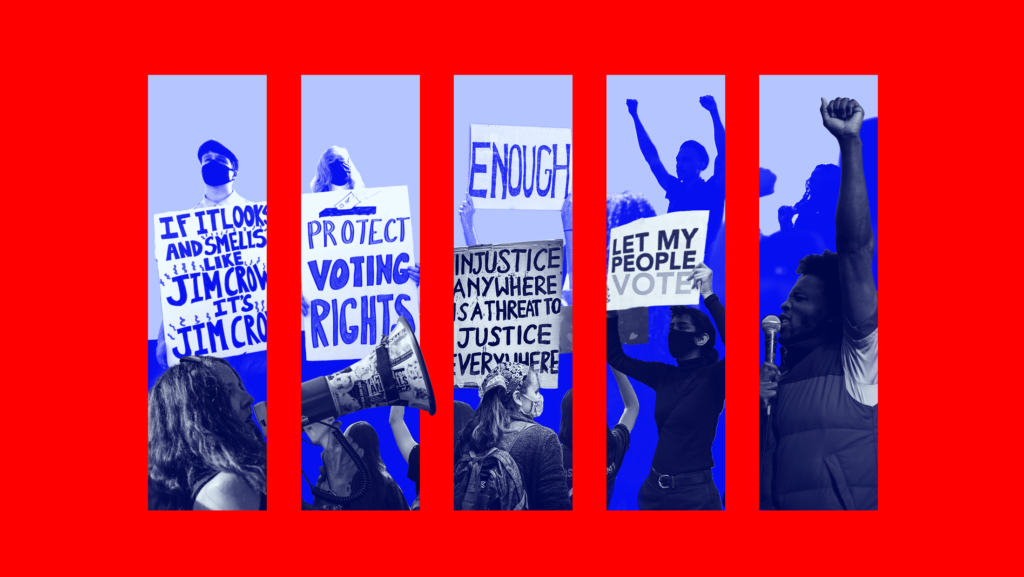Florida’s Returning Citizens Are on the Frontlines of the Battle Over Democracy

Florida and democracy are in the headlines again. This time, it’s because the state government arrested dozens of Florida citizens for voting in August, even though the state gave many of those same individuals government-issued voter ID cards.
The Florida citizens being arrested for voting all have one thing in common: Like myself, they are people with past felony convictions who served their time and are reintegrating into the community. We call ourselves returning citizens.
For yet another election cycle, Florida’s returning citizens are on the frontlines of America’s battle over democracy. Florida’s returning citizens come from all walks of life and all regions of the state. We are neighbors, family members and colleagues. We are registered Republicans, Democrats and independents.
In 2018, the largest expansion of American democracy in a generation took place here in Florida, when nearly two-thirds of the state’s voters passed a constitutional amendment restoring the ability to vote for 1.4 million people with past convictions.
The state’s successful expansion of democracy was led by those of us with past convictions and our organization, the Florida Rights Restoration Coalition. We spent years organizing people from all walks of life and political persuasions to pass Amendment 4 in Florida. We rallied around our shared values of forgiveness, redemption and restoration, as well as the idea that a more vibrant democracy is good for everyone. Those basic building blocks helped directly impacted organizations all across the country to lead campaigns that have dramatically expanded democracy in recent years. As it turns out, there might not be a better evangelist for democracy than someone who lost their right to vote — and then got it back.
There is something deeply troubling and unsettling about how our state is reacting to this broken system.
To those of us on the frontlines, the ongoing fight over democracy is not about a political campaign or a singular moment. It is not about a politician. It’s bigger than that. It is about us. All of us. It is about our democracy, and our republic. It is about how we engage in our society together.
Florida’s election system is broken.
Specifically, it is broken on the front end, where the voter verification process typically takes place. This might sound overly technical, but it is important. Unlike other states, Florida currently does not have a statewide database to verify justice-impacted people’s voter eligibility. Due to that basic fact, Florida citizens receive voter eligibility cards and believe they can vote, only later to be arrested, jailed and charged all by the same state government.
Think about that. Florida families are being forced to deal with a broken election system that has their loved ones facing prison time due to voting-related charges. If you can’t count on the government to verify your voting eligibility, who can you count on?
We can do better.
Instead of high profile arrests of Florida citizens on questionable charges of voter fraud, it is long past time for us to embrace election integrity by immediately fixing the front end of our system. Real lives are at stake. It is worth the effort to roll up our sleeves and get this right. As the old law enforcement adage says, the best way to fight crime is to stop it from happening in the first place.
The simple fact is that none of these arrests should have happened. If Florida had a statewide database, a determination of eligibility could have occurred before voter IDs were distributed, and we would not be spending taxpayer dollars on investigations, arrests and court costs. Nor would we be seeing SWAT teams and Florida’s new election police arresting grandparents, neighbors and Florida citizens in their own communities.
These are people who told law enforcement that they felt invisible and not part of the community when they were unable to vote, and yet after being told by the government they could vote, they said voting made them feel like a full citizen in their community.
Does that sound like the profile of a person intentionally trying to commit voter fraud? There is something deeply troubling and unsettling about how our state is reacting to this broken system.
Florida has the responsibility to maintain accurate, timely voter rolls so that all eligible voters can access our election system. The state is the only entity that can give these voters assurances about their eligibility. That is why we are continuing to challenge the government to apply the necessary urgency and resources to fix the front end of our voter system problem right now rather than spend taxpayer dollars arresting and jailing Florida citizens later.
Year after year, we have advocated for automating the front end of the election process for people with past convictions. We have said this to policymakers and government officials at every level of government. Other states can manage this information effectively. So can we. But we need to make our democracy a priority. Until the state can fix this overarching issue, it needs to stop arresting and jailing Florida’s returning citizens for voting.
For lots of people with past convictions, voting is a step in our restorative journey. It is a journey that is not just good for us, but good for our entire society.
Unfortunately, many returning citizens cannot afford bail or a proper legal defense. That is why we are helping them. And encouraging people who are moved by their stories to become poll workers and poll watchers.
We believe that anyone who wants to participate in democracy and genuinely believes that they are eligible should not be punished because of the state’s confusing voter system. And we are all responsible for fixing our broken system.
Neil Volz is a returning citizen and the deputy director of the Florida Rights Restoration Coalition.